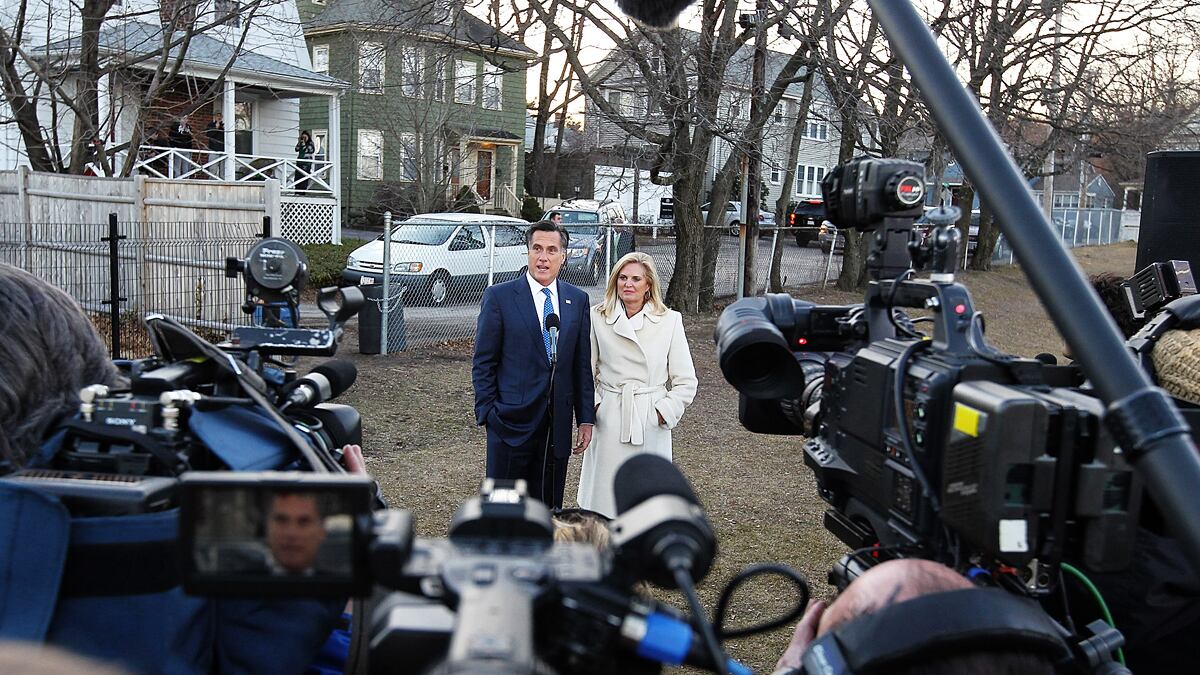At the same time that conservative critics deride Mitt Romney as a synthetic creature of an arrogant, out-of-touch establishment, leading voices of that same establishment (the prestige press, powerful pundits, cable and network news) have developed an obvious and undeniable hostility toward the former Massachusetts governor.

Why would the most influential elements of the mainstream media nourish this special contempt for the one candidate of the GOP Final Four who, by virtue of his elite family history, Harvard education, and moderate political past, might most plausibly appeal to Manhattan mandarins and Beltway Brahmins?
An honest consideration of Romney’s media problems reveals both the nagging weaknesses and underlying strength of his campaign.
Even the most cursory examination of primary coverage by The New York Times demonstrates that the Journal of Record despises the GOP frontrunner to an unprecedented extent and tirelessly attempts to discredit him.
On March 10, a typical headline proclaimed: “On Romney Song List, Guys Win, 18 to 1.” The shocking report by Jon Pareles revealed the scandalous news that the 19 song playlist released by the Romney campaign included only one title by a female (Carrie Underwood’s “All-American Girl”) and two contributions by African-American artists (vintage numbers by Nat King Cole and the Commodores). The clear implication seemed to be that the Mittster’s deeply conservative taste in pop music revealed his sexist and racist outlook, especially since the playlist also featured two songs (count ’em—two!) by the Las Vegas band the Killers, whose lead singer has become a national spokesman for (wait for it) … the Mormon Church.
As if this expose didn’t count as damaging enough, a front-page story on the same day highlighted Romney’s allegedly geeky, cold, and off-putting personality. Under the headline “Legislators Recall a Governor Who Didn’t Mingle,” Michael Barbaro noted that “Mr. Romney’s “awkward style and aloof manner” spoiled his relationships with the members of the Massachusetts Legislature who found him “an emotionally remote figure who tended not to socialize—and because of his Mormon religion did not drink.” The lengthy report rehearses a long list of petty slights from a legislature that was at the time more than 85 percent Democratic, while noting that “two former Romney aides said they pushed their boss to extend himself more to lawmakers, sensing his style was counterproductive.”
Meanwhile, the same report observes in passing that Romney vetoed 844 bills (an unsurpassable all-time record); failed in sweeping, radical efforts to transform the state’s judicial, university, and transit systems; and launched an ambitious (but unsuccessful) $3 million campaign to oust 131 Democratic legislators and replace them with loyal Republicans. What The New York Times never bothers to suggest is that this history gives substance to Mitt’s controversial claim that he was “a severely conservative governor.” Certainly, his willingness to confront the legislature, reshape key institutions, and launch a daring (if doomed) partisan pushback against lopsided Democratic majorities gives the lie to prevailing claims that his time as governor constituted the timid term of a “mushy Massachusetts moderate.” But the story in The Times gives no hint of this possible perspective, because it might be construed as favorable to Romney’s cause.
Instead, the Journal of Record reported on Rick Santorum’s surging campaign in Kansas, where he “spoke with conviction, sometimes shouting, and he was enthusiastically cheered by a couple hundred supporters in a rally at an airplane hangar.” That same campaign wrap-up (from Trip Gabriel) simultaneously mocked Mr. Romney, “who embraced his inner Southerner” during a stop in Mississippi but then, “by the time he got to Alabama later in the day, the Southern act was gone.”
Finally, the most withering dismissal of Romney’s candidacy (all in the same day’s newspaper, remember) came on the editorial page, with comments from columnists Charles M. Blow and Gail Collins.
Blow opined that Mitt “projects the slick feel of a man who’s trying to sell you something that you don’t want by telling you something that you don’t believe.”
Meanwhile, Gail Collins predictably recalled the infamous “dog on the car roof” story, treating a Romney family vacation in 1983 as the central focus of her campaign coverage. Two days before (March 8) she devoted her entire column to the tale (or tail), reviving the memory of the long-dead (and much lamented) Seamus the Irish setter who rode in a kennel on top of a station wagon when the Romneys and their five sons made a road trip to Canada 29 years ago. Like Cato the Elder who concluded every speech, on any subject, before the ancient Roman Senate with the ringing declaration “Carthago delenda est” (“Carthage must be destroyed”), Ms. Collins inserts some reference to Seamus in every column about the GOP campaign.
She acknowledges she has “brought this episode up like about 10 million times already” and says that she does so “because the Republican primary campaign has been an extremely long and depressing slog, and we need all the diversion we can get.” Meanwhile, she’s never acknowledged that the source of the original story was the Romney sons, who recalled the incident affectionately and admiringly about the father they idolize, nor has she taken note of the fact that Seamus not only survived the journey on the car roof without damage or complaint, but went on to an unusually long, productive Irish-setter life of some 15 years.
If the twisted obsession with the family dog isn’t enough proof of media hostility to Mitt Romney, there’s also the coverage of Super Tuesday, the biggest night of the primary season. If any other candidate (like Rick Santorum, or Newt Gingrich or, in an alternate universe, Rick Perry or Herman Cain) had won six of 10 primaries on that crucial day, including the hotly contested marquee prize of Ohio, and earned far more delegates than all his rivals combined, would TV reporters and print journalists have run stories about “Super Tuesday’s split decision” or the big winner’s “disappointing” inability to “close the deal”?
The media distaste for Gov. Romney has become so blatant that it counts as undeniable, even while reasonable people may disagree as to its sources.
The simplest explanation involves the natural reluctance of political journalists to see an early end to the GOP race. In this context, it makes sense to do everything in their power to retard Romney’s progress and to prolong the nomination battle and excitement (such as it is) so that they’re not reduced to stories about painstaking preparations for an autumnal Romney-Obama duel that won’t start in earnest for another four months.
There’s also the natural inclination to root for the underdog, which means kinder coverage for Santorum and even Gingrich than the lavishly funded, well-oiled Romney juggernaut. At this point, pushing for a Romney knockout amounts to cheering for Apollo Creed while Rocky Balboa (an Italian-American boy from Pennsylvania who’s lost a lot of fights, remember, like one candidate we could mention) provides a far more compelling backstory.
There’s also the tightly organized, fiercely disciplined nature of the Romney campaign itself. Reporters loved the seat-of-the-pants, hang-loose quality of John McCain’s celebrated Straight Talk Express in the 2000 campaign, with the candidate riding the back of the bus with his pals in the press corps, deploying his inexhaustible energy in salty tirades and colorful anecdotes, frequently punctuated with the earthy language naturally associated with a battle-tested naval aviator.
Mitt Romney’s buttoned-down (or, more appropriately, buttoned-up) corporate style counts as far less appealing, as does his obvious preference (actually unusual among presidential contenders) to spend any free time with his wife rather than entertaining the perpetually bored members of the traveling press.
Finally, there’s the factor of ideological bias and the clear preference of the most influential media figures for President Obama to win reelection. In private, some reporters admit they’d enjoy covering the sheer adventure of a second Obama term (nothing about Romney strikes them as adventurous or thrilling), but they also align with the president’s policies far more closely than they do with any Republican’s.
With this in mind, Romney gets especially harsh treatment because political insiders and veteran journalists agree with the proposition that he’s the only surviving candidate in the GOP who could conceivably unseat the incumbent.
The prospect of a Santorum candidacy raises the delightful prospect of an extended battle over social issues (same-sex marriage, gays in the military, contraception, abortion, women in combat, the value of university education, separation of church and state, homeschooling, evolution versus intelligent design) in which the chip-on-his-shoulder conservative contender goes down in hellfire flames and puts a definitive end to the long-running culture wars. The fight over the economy promised by Gov. Romney not only counts as far less explosive and polarizing, but far more unpredictable—with the uncomfortable possibility of Obama’s defeat.
Most conservatives instinctively understand that any candidate singled out by mainstream media for mean-spirited attack can be identified as a leader the journalistic establishment sincerely fears. The relentless ridicule of Ronald Reagan before his presidency, of George W. Bush, Rush Limbaugh, and Sarah Palin, relates directly to the left’s underlying concern over their seemingly indestructible appeal and potential to influence the electorate.
As the campaign for the GOP nomination sputters to its inevitable conclusion (yes, a Romney coronation in Tampa), it’s time to apply that same timeless logic to 2012 and to see the contempt for the GOP frontrunner as inescapably connected to his poll-tested ability to challenge Obama.
Part of the hostility to Mitt most certainly reflects natural, visceral reactions by cynical and seasoned reporters to various aspects of his personality: his extreme wealth and good looks, his too-perfect family with the Ralph Lauren clothes and country homes, and his devout commitment to a uniquely puritanical and rigorously demanding faith.
But it’s not just the sincere personal loathing that leaves Romney unacceptable to much of the media; it’s the combination of fear and loathing that makes him a special and irresistible target.






